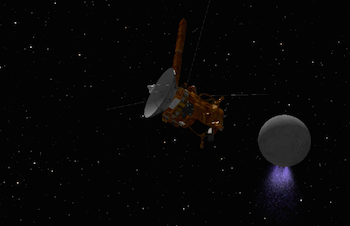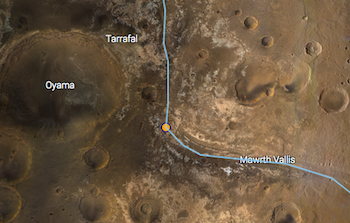Alpha Centauri Bb, An Earth-like Planet Orbiting Our Closest Star, Has Just Vanished. In Fact, A New
Alpha Centauri bb, an Earth-like planet orbiting our closest star, has just vanished. In fact, a new study suggests it never actually existed outside of a blip in the data.
The planet was discovered in 2012, and it was a pretty big deal at the time. According to researchers’ best estimates, Alpha Centauri bb appeared to have a mass similar to Earth and was orbiting its star at a distance similar to Mercury.
Best of all, it was only 4.3 light-years away – a whole lot closer than most other Earth-like exoplanets – and existed in a star system that had housed the science-fiction characters of Avatar and Transformers.
But a year after its discovery, a separate group of researchers called the discovery into question, when they found only weak evidence that the planet existed. And now a new study suggests that Alpha Centauri bb was never more than a ‘ghost’ in the data.
The research serves as a cautionary tale to astrophysicists hunting for evidence of planets orbiting distant stars, and reminds us of how hard it is to work out what’s going on using sporadic data taken from distant star systems.
Continue Reading.
More Posts from Inter-stellxr-blog and Others
Solar System: Top 5 Things to Know This Week
1. A Ceres of Fortunate Events

Our Dawn mission continues its exploration at Ceres, and the team is working with the data coming back to Earth, looking for explanations for the tiny world’s strange features. Follow Dawn’s expedition HERE.
2. Icy Moon Rendezvous

One of the most interesting places in the entire solar system is Saturn’s moon Enceladus, with its underground ocean and spectacular geyser plume. This month, the Cassini spacecraft will be buzzing close by Enceladus several times, the last such encounters of the mission. On October 14, Cassini will perform a targeted flyby at a distance of just 1,142 miles (1,838 kilometers) over the moon’s northern latitudes. Ride along with Cassini HERE.
3. Make Your Own Mars Walkabout

You can retrace Opportunity’s journey, see where the Curiosity rover is now, or even follow along with fictional astronaut Mark Watney from The Martian movie using the free online app MarsTrek. The app lets you zoom in on almost any part of the planet and see images obtained by our spacecraft, so you can plan your on Red Planet excursion. Take a hike HERE.
4. Elusive Features on Jupiter

New imagery from our Hubble Space Telescope is capturing details never before seen on Jupiter. High-resolution maps and spinning globes, rendered in the 4K Ultra HD format, reveal an elusive wave and changes to Jupiter’s Great Red Spot. Explore Jupiter HERE.
5. Mr. Blue Sky

Another week, another amazing picture from Pluto. The first color images of Pluto’s atmospheric hazes, returned by our New Horizons spacecraft last week, reveal that the hazes are blue. Who would have expected a blue sky in the Kuiper Belt? Most of the data collected during July’s Pluto flyby remains aboard the spacecraft, but the team publishes new batches of pictures and other findings on a weekly basis. Keep up with the latest HERE.
Make sure to follow us on Tumblr for your regular dose of space: http://nasa.tumblr.com

Space imaging progress..
via reddit








Check out these 10 cool facts about Mercury here: http://astronomyisawesome.com/solar-systems/cool-facts-about-mercury/

There’s been a rather startling decision today amongst the SETI (search for extraterrestrial intelligence) researchers.
Seth Shostak, senior astronomer at the SETI Institute, announced to his peers at a conference today that it’s time to begin what’s known as ‘active SETI’.
This is when we actively broadcast and effectively ‘alert’ potential neighbors to our presence.
Needless to say, this was a very polarizing conference.
People from Stephen Hawking all the way to science fiction writer David Brin have spoken out against broadcasting our presence into interstellar space.
They both have made comparisons to what happened when industrial civilizations first encountered indigenous peoples. Things never went well for the locals.
David Brin spoke at the conference and said, “The arrogance of shouting into the cosmos without any proper risk assessment defies belief. It is a course that would put our grandchildren at risk.”
I was initially sidelined by the idea. SETI Institute has never broadcasted into space in an attempt to make humanity’s presence obvious to alien observers. I hadn’t therefore really considered the topic much and shared the same worries as David Brin initially.
In my opinion though Dr. Shostak put an end to that worry:
“I don’t see why the aliens would have any incentive to do that.
Beyond that, we have been telling them willy-nilly that we are here for 70 years now. They are not very interesting messages but the early TV broadcasts, the early radio, the radar from the Second World War - all that has leaked off the Earth.
Any society that could come here and ruin our whole day by incinerating the planet already knows we are here.”
The point is if there’s a hostile and capable alien presence nearby, they would already know about us. The technology required to get to Earth even from the nearest star system is far more advanced than anything we can even dream up at the moment. Detecting our presence at that point is a cake walk.
Active SETI, would be a redundant risk as we’re clearly visible to those significantly advanced civilizations already (if there are any). That we’re here at all still suggests there are none.
To any nearby neighbors stuck on their home planets or solar systems, we are now going to be actively broadcasting messages.
The search is on.
Read more about today’s meeting at BBC World News.
(Image credit: ESO)

The rings of Saturn as seen from the Cassini space probe. (via)

Check out Fingerprints of Water on the Sand via NASA http://ift.tt/1Mxtpaz

A Quadruple Sky Over Great Salt Lake
me: wanna see a picture of my boyfriend
person: sure
me: *pulls out 10 dollar bill*
person:
me: ... he sings, too
How you look at color is about to get all messed up…
A while back, I asked you to describe what color the moon appears to your eye. I got some pretty varied and entertaining answers, but you overwhelmingly agreed: The moon is essentially white or bright silver.
Well, you’re wrong.
The moon’s not white at all. It’s actually closer in color to an asphalt road, as we can clearly see in this 100% actually real series of images taken of the moon transiting Earth, courtesy of NOAA’s DSCOVR satellite:

That whole “the moon is white” thing? It’s just a nasty trick played on your brain by … well, another part of your brain. It has to do with the fact that our eyes perceive illumination in a scene relatively, not absolutely. It’s also why this GIF breaks your brain a little:

Watch this week’s It’s Okay To Be Smart video above to find out more!
Bonus: The PBS Digital Studios Science Squad™ brings you a double whammy of perceptual illusions this week! White isn’t the only light that messes with your visual system, not by a long shot. Did you know that red + green can look like… yellow?

Check out the video below from The Physics Girl and let Dianna teach you why, when it comes to colors, you should never quite believe your eyes:








Amazing photos of U.S. spacewalks throughout the years.
-
 cowgirlmilkers reblogged this · 9 years ago
cowgirlmilkers reblogged this · 9 years ago -
 cowgirlmilkers liked this · 9 years ago
cowgirlmilkers liked this · 9 years ago -
 tinyspringtrap reblogged this · 9 years ago
tinyspringtrap reblogged this · 9 years ago -
 neurokem reblogged this · 9 years ago
neurokem reblogged this · 9 years ago -
 ottergaijin-blog liked this · 9 years ago
ottergaijin-blog liked this · 9 years ago -
 sciencenewsforyou reblogged this · 9 years ago
sciencenewsforyou reblogged this · 9 years ago -
 assassinaipl liked this · 9 years ago
assassinaipl liked this · 9 years ago -
 eazythegriot reblogged this · 9 years ago
eazythegriot reblogged this · 9 years ago -
 skywxlkertrash-blog liked this · 9 years ago
skywxlkertrash-blog liked this · 9 years ago -
 starsick liked this · 9 years ago
starsick liked this · 9 years ago -
 endarkculi liked this · 9 years ago
endarkculi liked this · 9 years ago -
 cubecubed reblogged this · 9 years ago
cubecubed reblogged this · 9 years ago -
 peevote reblogged this · 9 years ago
peevote reblogged this · 9 years ago -
 peevote liked this · 9 years ago
peevote liked this · 9 years ago -
 ivyvine6 reblogged this · 9 years ago
ivyvine6 reblogged this · 9 years ago -
 ivyvine6 liked this · 9 years ago
ivyvine6 liked this · 9 years ago -
 omegaresnovae reblogged this · 9 years ago
omegaresnovae reblogged this · 9 years ago -
 spacemouse reblogged this · 9 years ago
spacemouse reblogged this · 9 years ago -
 clarritea reblogged this · 9 years ago
clarritea reblogged this · 9 years ago -
 mexicanmansplainer reblogged this · 9 years ago
mexicanmansplainer reblogged this · 9 years ago -
 micchy-did-nothing-wrong reblogged this · 9 years ago
micchy-did-nothing-wrong reblogged this · 9 years ago -
 its-am-chan reblogged this · 9 years ago
its-am-chan reblogged this · 9 years ago -
 azuredreamerasks liked this · 9 years ago
azuredreamerasks liked this · 9 years ago -
 breakinguu reblogged this · 9 years ago
breakinguu reblogged this · 9 years ago -
 internet-janitor liked this · 9 years ago
internet-janitor liked this · 9 years ago -
 putuksstuff liked this · 9 years ago
putuksstuff liked this · 9 years ago -
 kittyklippings liked this · 9 years ago
kittyklippings liked this · 9 years ago -
 conspicuouslad reblogged this · 9 years ago
conspicuouslad reblogged this · 9 years ago -
 gettingintoknives liked this · 9 years ago
gettingintoknives liked this · 9 years ago -
 butchious reblogged this · 9 years ago
butchious reblogged this · 9 years ago -
 catbreon reblogged this · 9 years ago
catbreon reblogged this · 9 years ago -
 gornishka reblogged this · 9 years ago
gornishka reblogged this · 9 years ago -
 cloudyskiestonight liked this · 9 years ago
cloudyskiestonight liked this · 9 years ago -
 maddyandthehalfbloodprince liked this · 9 years ago
maddyandthehalfbloodprince liked this · 9 years ago -
 ask-fedora liked this · 9 years ago
ask-fedora liked this · 9 years ago -
 silviadragoness liked this · 9 years ago
silviadragoness liked this · 9 years ago -
 sile-animus reblogged this · 9 years ago
sile-animus reblogged this · 9 years ago -
 sile-really liked this · 9 years ago
sile-really liked this · 9 years ago -
 ego-death-girl reblogged this · 9 years ago
ego-death-girl reblogged this · 9 years ago -
 ego-death-girl liked this · 9 years ago
ego-death-girl liked this · 9 years ago
"I don't know who will read this. I guess someone will find it eventually. Maybe in a hundred years or so." -Mark Watney
174 posts
